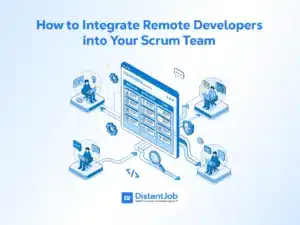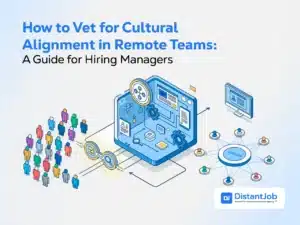Building a strong company culture is key, especially in remote settings where it’s easy to feel disconnected, working just for the paycheck. Creating an engaging and inclusive culture isn’t about mind control or hypnosis—it’s about social architecture.
By cultivating a vibrant company culture, you ensure that every remote team member cares about their work and feels part of a unified team, leading to enhanced engagement and productivity.
Most people respond well to camaraderie and social bonds. No matter how ambitious someone may be, he or she will likely work harder to help out a group of people when they feel part of a strong team, rather than working for a disengaged boss whose personality is only glimpsed through e-mail signatures.
These employees keep innovating and moving forward because an organization with a strong company culture stops being just a company they work for and morphs into their work “family”, proud to be a part of “their” company.
Why is Company Culture Important?
A positive company culture fosters greater employee engagement, which is crucial for remote teams that lack physical interactions. Engaged employees are more productive and committed to the organization’s goals.
Are you still not convinced? Consider this: several studies have proven that disengaged employees will inevitably cost you money.
Research demonstrates irrefutable evidence: team members who are disengaged will affect your bottom line. A recent (2013) study from Gallup confirms that companies with a high employee engagement percentage ( that is 10 engaged to 1 disengaged) reported increased earnings of almost 150% per share over the previous two years.
Building culture is one of the biggest challenges when working with a remote team. It’s hard to build a culture through e-mails and instant messages. There’s obviously a lack of opportunity to mingle, casually converse, participate in team activities or simply hang out with colleagues.
Luckily for us, this challenge comes from preconceptions about remote work, not actual roadblocks. From social networks to online video game communities, there is ample evidence that people can use technology to bond over long distances.
So what do you need to do? Above all, you need to commit! Remote work is more than a perk. For those who practice it, it’s a lifestyle. You should expect from your remote employees the same things you expect from your on-site staff; and by the same token, you should understand that their needs and challenges differ from those of a local employee.
5 Tips to build a positive remote working culture
Here are a few ideas you can implement to help replace the traditional physical connection with the unique aspects of a virtual friendship:
1. Create a Group Playlist on YouTube.
Music is highly tuned to our emotional connections and has been known to bring diverse groups together since the dawn of civilization. So why not have, say each team member, submit three of their all-time favorite songs to share with the other team members?
Or maybe try building a high-energy, wake up, kick ass playlist for the mornings to rev things up, with another, more mellow, relaxed list for the evening, to help the team wind down and finish up their work before shutting down on a high note, with a real sense of satisfaction and peace of mind.
2. Create a Dedicated Casual Chat Session/Group
While it may sound unproductive at first, most teams benefit from having a place where they can talk about topics unrelated to work. Slack is really good for this, allowing you to personalize the chat sessions with add-ons that give a more relaxed and familiar vibe – this gif library is one of our favorites.
3. Remember to Always Keep an Open Door Policy
Meetings are good. In fact, they are critical to productivity because, when well directed, they facilitate the flow of communication.
But keeping an open-door policy is different: it sends a message to all your employees that you’re always available to listen to them, making them feel you are not only accessible but also a member and working part of the team.
Culture comes from the top – when your employees feel they can communicate freely with you, both in a formal and informal manner, they will start feeling the same about communicating with the rest of the team and company.
This is how you encourage openness and transparency among your workforce: by role-modeling and setting that example first and foremost.
4. Create a Team Workout Group
There’s a reason some of the most successful companies in the world offer gym memberships as a perk. Fitness and health are absolutely crucial for top performers to keep their edge during work.
At the same time, there is no greater impetus for exercising than having a group or a partner, especially if they share a common workout regimen, like running or weights. This is especially true for remote employees, as working from home can lead to more sedentary habits.
Using a group workout app – MakeMe is a solid choice – to create an exercise group where everyone can track and share their workouts will not only motivate your employees to work out regularly but will likely also allow them to further bond over the shared experience.
5. Create a shared reading list.
Jim Rohn is often quoted saying “Poor people have a big TV. Rich people have a big library.” We are what we repeatedly consume, and while your team will increase their knowledge and individual culture reading a diverse selection of books, doing it together will also establish life-long bonds. We grow closer to the people we learn with just as we did throughout of formative years.
It couldn’t be easier to make this work: simply create a private group in the free service Goodreads and invite your employees / co-workers. Then anyone in the group can start adding their favorite books to the shared group bookshelf, along with notes and recommendations. Check out Goodreads and create that list today!
This is just the tip of the iceberg… There’s so much you can do to create a strong, incredible company culture that we could write an entire book about it.
Oh wait, we have! Grab it now free here.





